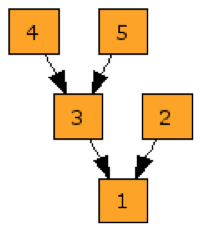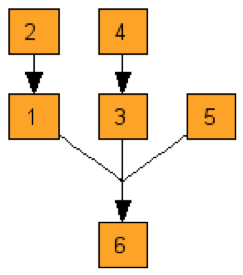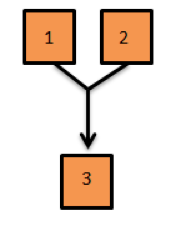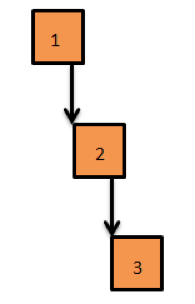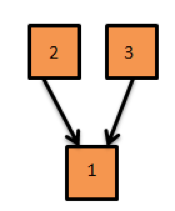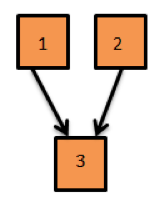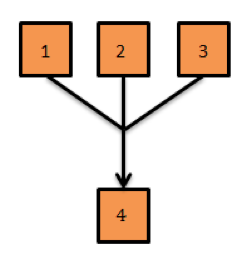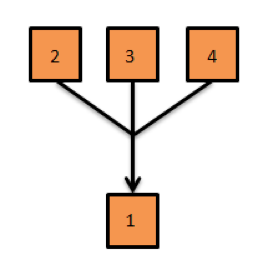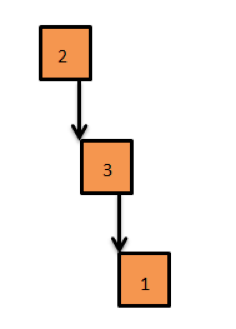PHI-130: Critical Reasoning/LP2 Answer Key
Quizzes 3, 4 and 5
Journal Assignment 3
Identify the premises and conclusions in the following arguments:
Note: We will help you with answers to examples (4) and (5). Apply the knowledge you have gained from our discussions and explanations and complete activities (1), (2) and (3) on your own. A good way to identify premises and conclusions in arguments is to underline the signal words, that is, the premise and conclusion indicators. Below we provide two lists of phrases that could serve as indicators to identify premises and conclusions. You may find these premise and conclusion indicators helpful when you have to identify premises and conclusions in arguments.
Let us now do example (4) together:
Prisons in South Africa are a failure. First, they do not rehabilitate anyone. Second, they don’t so much punish as provide free room and board. Third, they bring criminals together, thereby allowing them to swop information and refine their felonious offenses. Finally, those who have spent time in prison are far more likely to commit additional crimes than those who have never been in prison.
To identify the premises and conclusion of the argument, we underline the premise and conclusion indicators. This is done in the following way:
Prisons in South Africa are a failure. First, they do not rehabilitate anyone. Second, they don’t so much punish as provide free room and board. Third, they bring criminals together, thereby allowing them to swop information and refine their felonious offences. Finally, those who have spent time in prison are far more likely to commit additional crimes than those who have never been in prison.
In this argument the words “first”; “second”; “third”; and “finally” serve as premise indicators. These signal words help us to identify the premises.
The premises of the argument are:
- “They [prisons] do not rehabilitate anyone”;
- “They [prisons] don’t so much punish as provide free room and board”;
- “They bring criminals together, thereby allowing them to swop information and refine their felonious offenses”; and
- “Those who have spent time in prison are far more likely to commit additional crimes than those who have never been in prison”.
The conclusion of the argument is: “Prisons in South Africa are a failure”.
Let us now do example (5) together:
Capital punishment is morally wrong. It consists of killing human beings. The killing of human beings is morally wrong.
In this argument there are no premise or conclusion indicators. How, then, do we identify the premises and conclusion of arguments, where indicator words were excluded? When we come across arguments where premise and conclusion indicator words or phrases have been left out, we could apply the principle of ‘charitable interpretation’. This means that the argument should be interpreted in such a way that the premises give the strongest support for the conclusion. In our opinion, there is no sense in dismissing an argument just because its premises and conclusion are not explicitly indicated.
Let us apply the principle of ‘charitable interpretation’ to the argument in example (5).
Capital punishment is morally wrong. It consists of killing human beings. The killing of human beings is morally wrong.
For the premises to supply the strongest support for the conclusion, we can rewrite or recast this argument in the following way:
The killing of human beings is morally wrong. Capital punishment consists of killing human beings. Therefore, capital punishment is morally wrong.
The conclusion of the argument is: “Capital punishment is morally wrong”. The premises of the argument are: “The killing of human beings is morally wrong” and “Capital punishment consists of killing human beings”.
Journal Assignment 4
Earlier on we have seen that a useful way to analyze arguments is to bracket the statements, underline the signal words (if there are any) and identify the premises and conclusions in the argument. Let us, then, apply this strategy to the arguments in Journal Assignment 4:
Argument 1:
The diseases that people develop and their chances of recovering from them are related to their personalities. Some types of personality are more likely to develop heart disease or back pain. And patients with cancer tend to respond better to treatment if they can maintain an optimistic, combative attitude. Sometimes they are taught to visualise their disease as an enemy and to imagine fighting it. This fosters states of mind that hinder the progress of the disease. So we need to influence the mind in order to influence the body: our minds are distinct factors that control our bodies.
1. [The diseases that people develop and their chances of recovering from them are related to their personalities].
2. [Some types of personality are more likely to develop heart disease, or back pain].
3. And [patients with cancer tend to respond better to treatment if they can maintain an optimistic, combative attitude].
4. [Sometimes they are taught to visualise their disease as an enemy and to imagine fighting it].
5. [This fosters states of mind that hinder the progress of the disease].
6. So [we need to affect the mind in order to affect the body].
7. [Our minds are distinct factors that control our bodies].
Chain argument:
Main conclusion — 7
Premise for main conclusion — 6
Sub-conclusion — 6
Premises for sub-conclusion — 1, 2, 3, 4, 5
Argument 2:
Depression is a state of mind. But depression can often be relieved by antidepressant drugs. These drugs must affect our bodies, and in fact we know quite a lot about how they affect the brain. So changes in the brain can cause changes in the mind. So the mind is an aspect of the brain.
1. [Depression is a state of mind].
2. But [depression can often be relieved by antidepressant drugs].
3. [These drugs must affect our bodies]
4. and in fact [we know quite a lot about how they affect the brain].
5. So [changes in the brain can cause changes in the mind].
6. So [the mind is an aspect of the brain].
Chain argument:
Main conclusion — 6
Premise for main conclusion — 5
Sub-conclusion — 5
Premises for sub-conclusion — 1, 2, 3, 4
Argument 3:
Noise is an environmental pollution which upsets people, causes tempers to fray and builds up tension between neighbours. People tolerate a great deal of unnecessary noise even though it often drives them to distraction. Local authority noise patrols can obtain warrants to enter premises where noise and alarms are disturbing the neighbourhood. They can oppose the renewal of licences for noisy pubs. They can apply to the courts for fines of up to $4,000 for persistent noise offenders. Note that in this passage the premises are supplied, but the conclusion is missing. Therefore we are expected to fill in the implied conclusion.If we read this passage very carefully, understand what the author is trying to say, and think about the meaning of the premises in this argument, then we will see that the arguer is trying to make the following two points: (1) Noise is an environmental pollution which upsets people, and (2) we ought to make more use of local authority noise patrols to combat noise pollution. We should note that the main conclusion in this argument is missing. The think the main conclusion is: We ought to make more use of local noise patrols. A full analysis of the structure of this argument will only be complete when we have given the implicit main conclusion. To do this we need to rewrite (recast) the passage. We shall also place the statements one after the other to draw out the argument’s chain character:
1. [Noise is an environmental pollution which upsets people] because
2. [Noise causes tempers to fray and because noise builds up tension between neighbours]
3. [People tolerate a great deal of unnecessary noise even though it often drives them to distraction]
4. [Local authority noise patrols can obtain warrants to enter premises where noise and alarms are disturbing the neighbourhood]
5. [Local authority noise patrols can oppose the renewal of licences for noisy bars]
6. [They can apply to the courts for fines of up to $4,000 for persistent noise offenders].
7. Therefore, [we ought to make more use of local noise patrols.
Chain argument
Main conclusion — 7
Premises for main conclusion — 1, 4, 5, 6
Sub-conclusion — 1
Premises for sub-conclusion — 2, 3
We should note that the main point (issue) of this argument is that we ought to make more use of local authority noise patrols to combat noise pollution. Also, the premises supplied in the argument are relevant and give adequate support to the conclusion.
Argument 4:
The fact is indisputable that, taking the average, say, of a hundred brains, the man has five or six ounces more brain than the woman. Some women will, of course, be found to have much larger brains than some men; but whenever the comparison embraces a sufficient number to yield a fair average, the superiority is invariably on the side of the man. And it is worthy of special remark that it is in the cerebrum, or brain proper, that these differences are very trifling. Now, when we reflect that the cerebrum is generally supposed to be the exclusive organ of the intellectual, volitional, and emotive faculties, and that it forms about nine-tenths of the whole mass usually designated as “the brain”, or more correctly as “the encephalon”, this marked superiority in the male cerebrum seems to lend scientific authority to the general verdict regarding the intellectual inferiority of women.
1. [The fact is indisputable that, taking the average, say, of a hundred brains, the man has five or six ounces more brain than the woman]1.
2. [Some women will, of course, be found to have much larger brains than some men]2
3. but [whenever the comparison embraces a sufficient number to yield a fair average, the superiority is invariably on the side of the man]3.
4. And it is worthy of special remark that [it is in the cerebrum, or brain proper, that these differences are very trifling]4.
5. Now, [when we reflect that the cerebrum is generally supposed to be the exclusive organ of the intellectual, volitional, and emotive faculties]5,
6. and [that it forms about ninetenths of the whole mass usually designated as “the brain”]6,
7. or more correctly as “the encephalon”, [this marked superiority in the male cerebrum]7
8. seems to lend [scientific authority to the general verdict regarding the intellectual inferiority of women]8.
Chain argument:
Main conclusion — 8
Premises for main conclusion — 1, 4, 5, 6, 7
Sub-conclusion — 1
Premises for sub-conclusion — 2, 3
Quiz 3
A. Complex
- Marriage is becoming unfashionable.
- Divorce rate is at an all-time high, and
- cohabitation is increasingly presented in a positive manner in the media.
- Movies are full of characters who live together and unwilling to commit to a lifelong partnership.
- Even newspaper columnists recommend people to live together for an extended period before marriage in order to test their compatibility.
B. Complex
- Jane doesn’t have any eggs.
- Jane can’t bake a cake.
- Harry didn’t bring home the cake mix.
- Harry forgot to shop.
- You need ingredients to bake a cake.
- There will be no cake for dessert at Jane and Harry’s tonight.
C. Complex
- All men are mortal.
- Socrates is a man.
- Socrates is mortal.
D. Complex
- Radiation can cause cancer.
- Nuclear power plants can be harmful to humans.
- We should shut down all nuclear power plants.
E. Simple
- Summer is the best time of year.
- You can go surfing in the ocean.
- School is out.
F. Simple
- Sunspots can interfere with Earth’s magnetic fields.
- Many types of communications depend on Earth’s magnetic fields.
- Sunspots can cause poor communications.
G. Simple
- The stock market influences the confidence that people have in the economy.
- When the stock market is high, people feel wealthier.
- An interest rate decrease will improve the stock market.
- The Federal Reserve Board should lower interest rates.
H: Simple
- Sacramento appears to be on track for a “soft landing”.
- Sacramento has decent job growth.
- There will probably be an increase in job hiring by the state government.
- There are signs of stabilization in the housing market.
I: Complex
- We can’t trust science.
- The scientific method uses inductive reasoning and
- inductive reasoning is probabilistic; it never reaches absolute certainty.
Quiz 4
Identify Premises and Conclusions in an argument:
1. It will likely rain today. The weatherman said it would rain and he is reporting information gathered by reliable instruments.
- Premises:
- The weatherman said it would rain.
- He is reporting information gathered by reliable instruments.
- Conclusion:
- It will likely rain today.
2. The man I saw break into the apartment was wearing a hoodie. Philip is wearing a hoodie. He must be the man I saw break into the apartment.
- Premises:
- The man I saw break into the apartment was wearing a hoodie.
- Philip is wearing a hoodie.
- Conclusion:
- Philip must be the man I saw break into the apartment.
3. All dogs are mammals; Rex is a dog; Rex is a mammal.
- Premises:
- All dogs are mammals; Rex is a dog
- Conclusion:
- Rex is a mammal
Quiz 5
Identify Value and Empirical arguments
Value = V; Empirical = E
- _E_ Dogs have tails. Fido is a dog. Fido has a tail.
- _V_ John Huston made great movies. “The Maltese Falcon” was directed by John Huston. “The Maltese Falcon is a great move.
- _E_ Hybrid cars use less fossil fuel than standard cars. A Prius is a hybrid car. Driving a Prius will contribute to lessening climate change.
- _V_ A good test question tests material covered in the course. The questions on Prof. Smith’s exam all came from material covered in the course. Prof. Smith’s exam questions were good.
- _V_ War is hell. We should not go to war.
- _E_ 65% is the lowest passing grade on the exam. Erin got 80% on the exam. Erin passed the exam.
- _V_ Whatever reduces pain is morally good. Legalizing euthanasia would reduce pain. Therefore, euthanasia is morally good.
- _E_ When it rains, it pours. It’s raining. Therefore it’s pouring.
- _E_ Fingerprints are unique identifiers. Tom’s fingerprints were found on the gun. Tom shot Jim.
- _V_ The Bible says that killing innocents is a sin. Unborn babies are innocent. Therefore abortion is a sin.
- _E_ Oak trees produce acorns. There are acorns all over the ground. Therefore there must be an oak tree here.
- _V_ Confucius said that the greatest virtue involved children serving and honoring their parents. Mary is John’s mother. Therefore John should serve and honor Mary.
